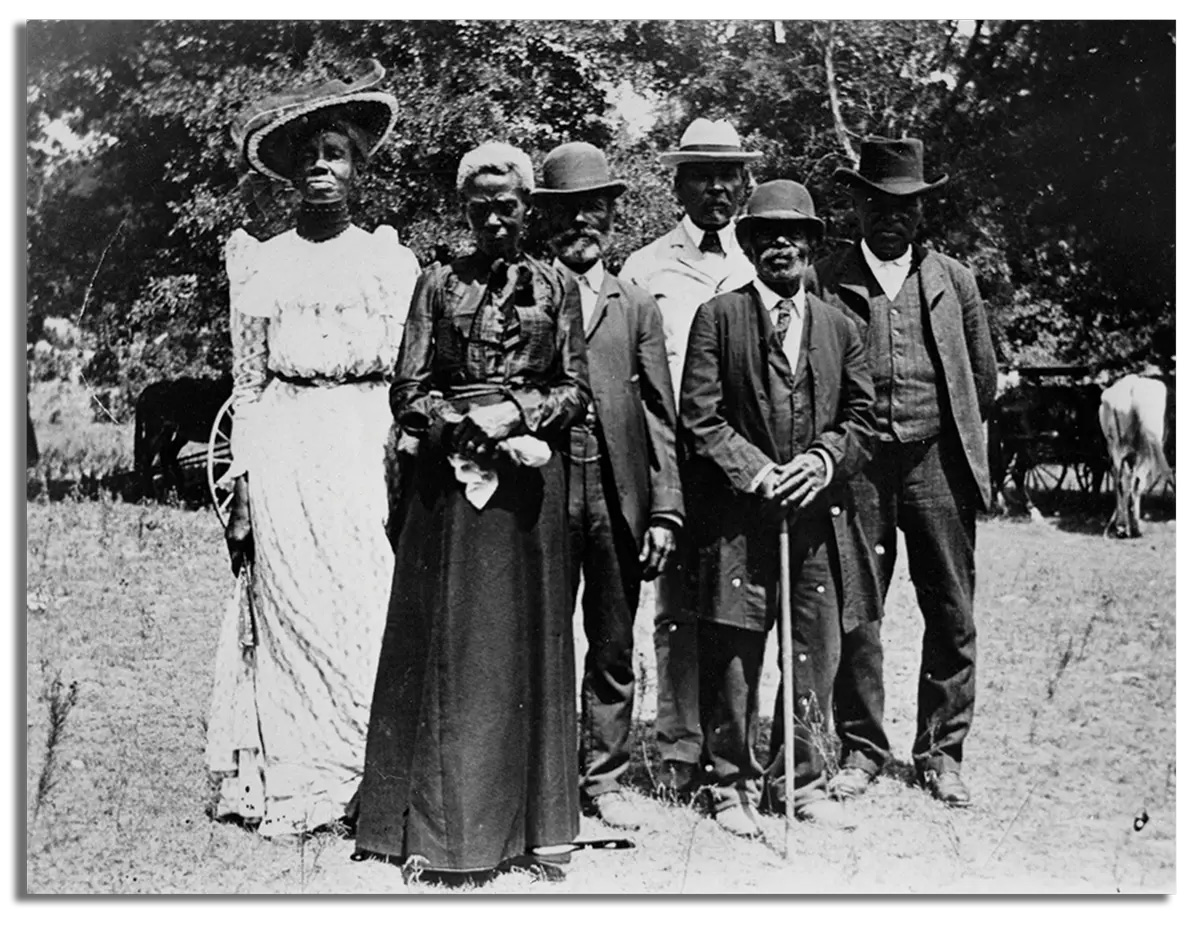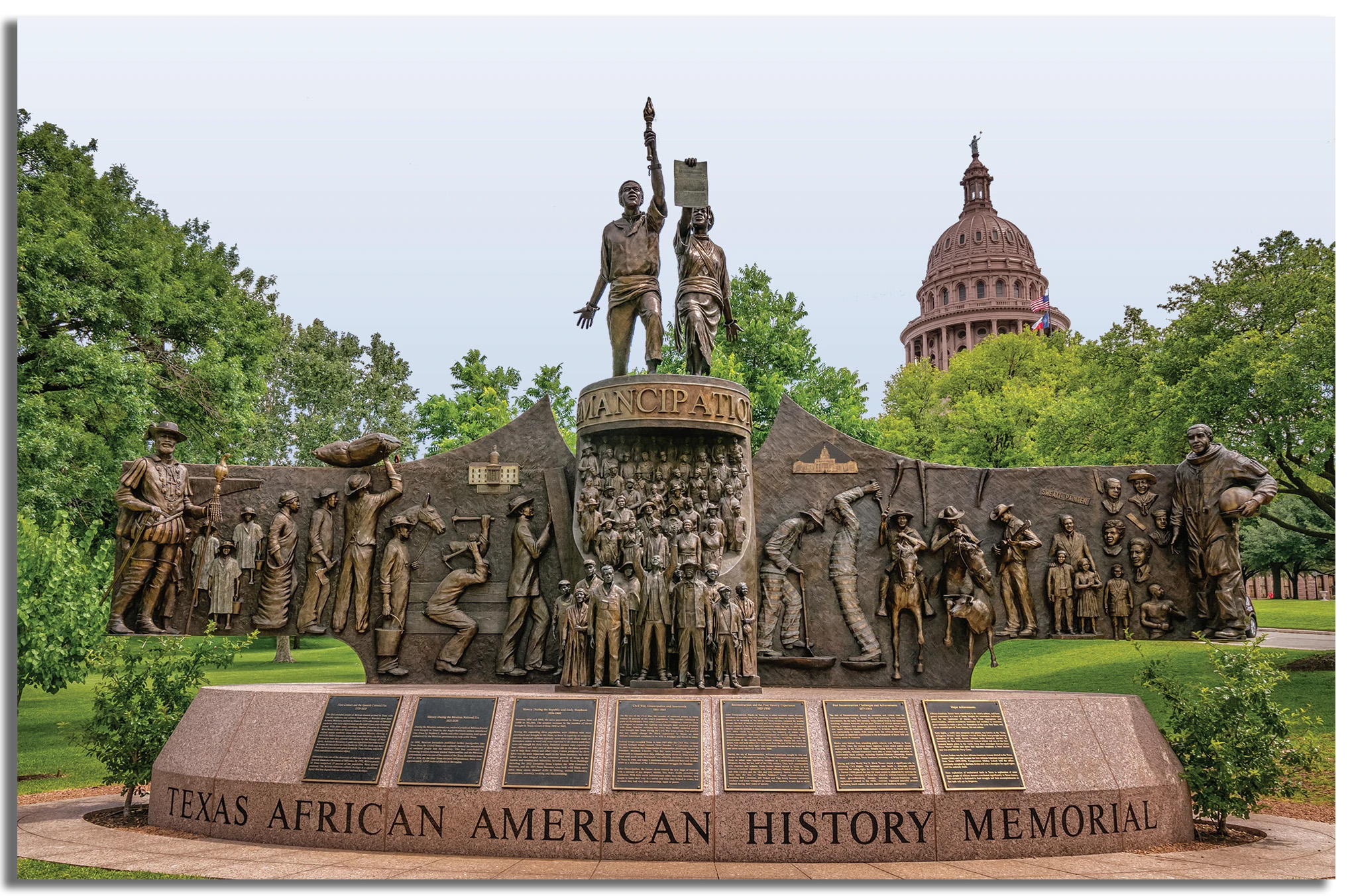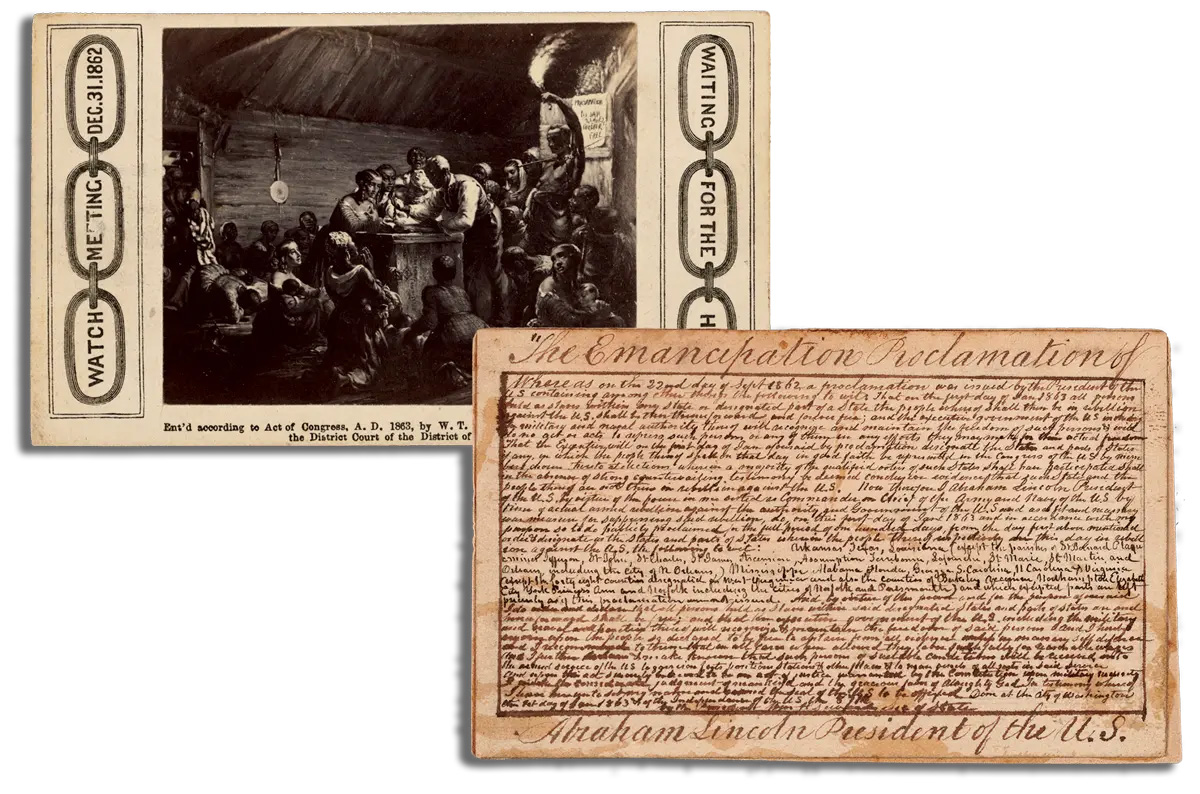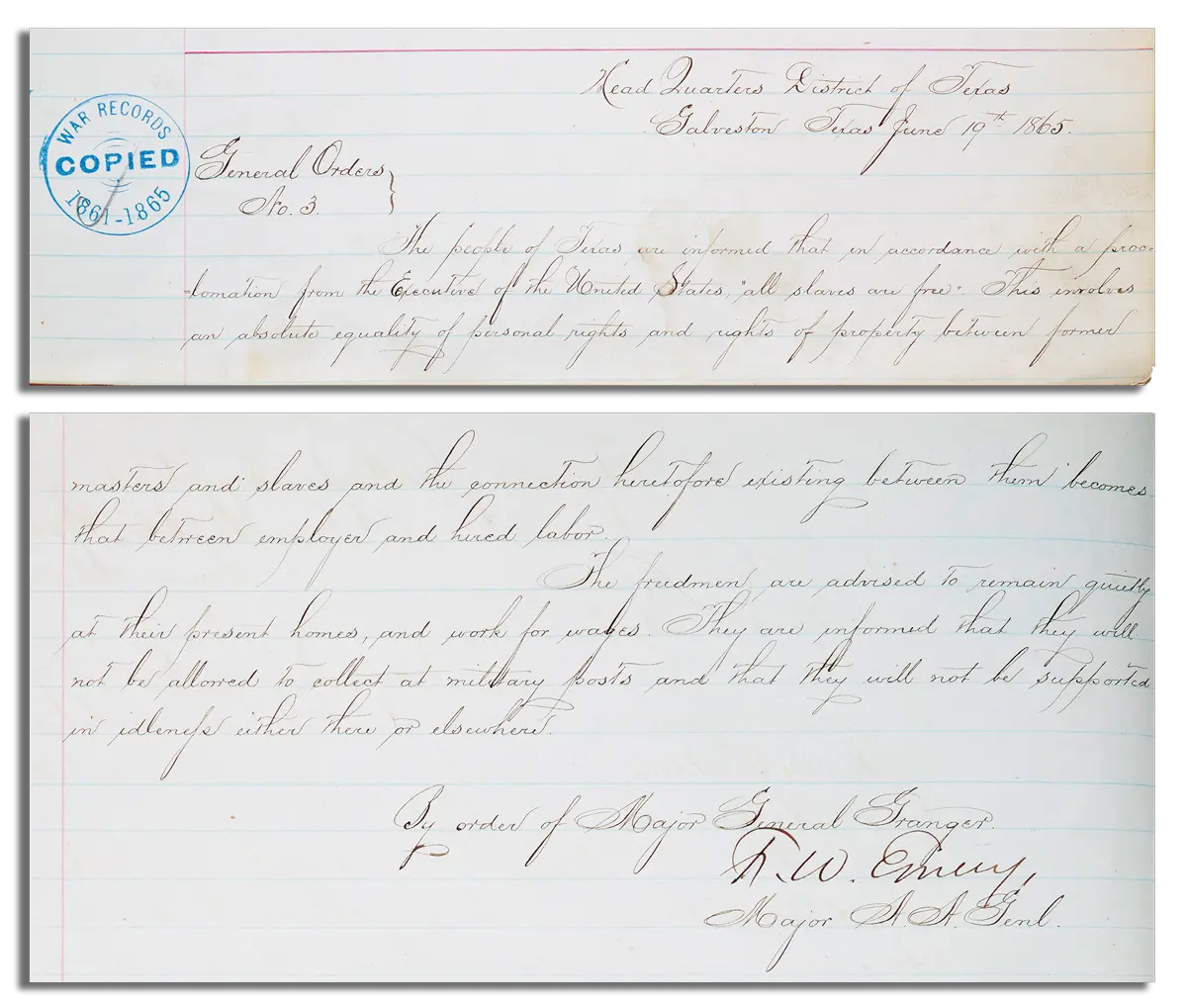20 August 1619
A transatlantic feat,
Slave ships filled keel to deck,
Enslaved hearts beat and beat,
Their voices sing to Gods unknown:
“When will I be free?”
19 April 1775
Colonists challenged the King,
Men and women, white and black,
And every shade between,
Their voices sang to a God well-known:
“We will fight to be free!”

A picnic at the Emancipation Day celebration, 19 June 1900. (Photo courtesy of Grace Murray Stephenson, via Austin History Center, Austin Public Library [PICA-05476])
14 October 1781
A battle, often ignored,
Enslaved Africans, muskets, and grit,
Dislodge the Redcoats once more.
Battle of Yorktown and Redoubt 9,
The enslaved men ask their Gods:
“Does victory make freedom mine?”
12 April 1861
A nation, torn apart,
Brother and cousins, swords drawn,
Pointed at our nation’s heart,
Soldiers cried to their Christian God:
“Will my death set others free?”
1 January 1863
A proclamation decree,
Unshackled chains, the Black Enslaved,
An attempt to make all free.
Texas slaves cried to their Gods:
“Why not us ... and … why not me?”
9 April 1865
End of the bloody war.
Over six hundred thousand dead,
Grant meets with Lee once more.
Blue and Gray mothers wailed to their God:
“Can our sons now be freed?”
1863 to ’65
Freedom took two years.
Texas ignored Emancipation.
More pain, more blood, more tears.
Field-slave Wagoner said to his God:
“What now will you have us fear?”

The Texas African American History Memorial, made of bronze and granite and erected in 2016 on the capitol grounds in Austin, traces the history of African Americans in Texas from the 1500s to the present. The central portion of the memorial depicts Juneteenth, which commemorates 19 June 1865, the announcement of the abolition of slavery in Texas, more than two years after President Abraham Lincoln signed the 1863 Emancipation Proclamation abolishing slavery. (Photo by José Pestana via Flickr)
19 June 1865
A glorious day indeed.
Arrival of troops in federal blue,
Texas Enslaved are freed.
A coal-skinned mother in Galveston shouts:
“We be free! We are free!”
1865 to ’77
Forty acres and a mule.
Reconstruction failed to hold,
Rich power brokers ruled.
Poor voices agonize to God:
“Will freedom find us soon?”
1865 to 2021
Juneteenth is freedom’s grace.
Celebrated Texas-wide,
Now ready for America’s embrace.
Deacon Wagner looked to the heavens:
“Is Juneteenth freedom’s taste?”
18 June 2021
This holiday, “they” celebrate,
Exactly what does it mean?
Am I allowed to participate,
To celebrate the free?
I asked my God for guidance:
“Join hands in liberty.”
19 June 2021
Juneteenth, Juneteenth
Let’s celebrate.
America righted a wrong.
Juneteenth, Juneteenth
Let’s elevate:
“With love, praise, and song.”

Top: A group of African Americans gathered around a man with a pocket watch, leaning on a pulpit made out of U.S. Sanitation Commission crates on 31 December 1862. A sign on the wall reads “1 Jan-Slaves Forever Free.” (Image courtesy of the Smithsonian National Museum of African American History and Culture Collection)
Right: Handwritten text of the Emancipation Proclamation on a card, circa 1863–1880s. (Image courtesy of the Smithsonian National Museum of African American History and Culture Collection)
19 June 2023
Juneteenth seeks to unite.
Indigenous, immigrant, enslaved or not,
America has earned this right.
Citizens quietly self-reflect:
“Juneteenth brings freedom’s might.”
2024 and beyond.
The next 100 years.
Juneteenth represents our quest.
Make freedom the last frontier.
Our grandchildren silently smile,
As June 19th now endears.
New Years, Easter, Memorial Day,
We lovingly recognize.
July the 4th and Labor Day,
Are gleefully embraced with pride.
Juneteenth, our newest holiday,
Can help unite our tribes.
My father’s story of olden times,
Included Juneteenth lore.
The slaughtered hog, the greens, the yams,
The songs, the dance, and more.
While Grandma sang a country tune:
“Knockin’ on Heaven’s Door”
If I am not free; You are not free.
If you are not free; I am not free.
America, our land of liberty.
We ask and pray:
“For equality.”
Juneteenth is for you,
Juneteenth is for me,
Our histories not aligned.
Regardless of each journey,
Our futures are intertwined.
I hear ancestral voices ask:
“America, will thine be mine?”

General Order No. 3, issued 19 June 1865. (Images courtesy of the National Archives)
Two and one-half years after President Abraham Lincoln’s historic Emancipation Proclamation, Maj. Gen. Gordon Granger issued General Order No. 3 on 19 June 1865, which informed the people of Texas that all enslaved people were now free. This day has come to be known as Juneteenth (also called Freedom Day or Emancipation Day), the oldest known celebration commemorating the end of slavery in the United States. The order reads,
The people of Texas are informed that, in accordance with a proclamation from the Executive of the United States, all slaves are free. This involves an absolute equality of personal rights and rights of property between former masters and slaves, and the connection heretofore existing between them becomes that between employer and hired labor. The freedmen are advised to remain quietly at their present homes and work for wages. They are informed that they will not be allowed to collect at military posts and that they will not be supported in idleness either there or elsewhere.
To view the full handwritten order, visit https://www.archives.gov/news/articles/juneteenth-original-document.
Col. Dwayne Wagner, U.S. Army, retired, and his five siblings celebrated Juneteenth in Texas from 1970 to 1978, and he has held Juneteenth gatherings around the world during his military travels from 1978 to 2008. His family originally migrated to East Texas under the name Wagoner, their enslaved name, and after freedom changed their name to Wagner. A speaker, panelist, and social media provocateur, Wagner focuses on asking Americans to see the world through the eyes of others and treat all with dignity and respect. He taught policy and strategy at the Command and General Staff College, Fort Leavenworth, Kansas, from 2008 to 2023, earning recognition as the 2017 Civilian Educator of the Year and the Association of the United States Army Kansas City Chapter 2023 Civilian Employee of the Year.